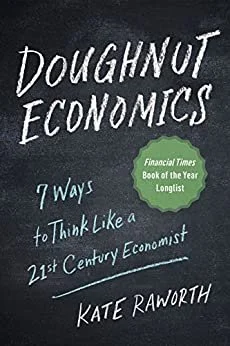Travel Documents 111: Doughnut Economics
by Kate Raworth
Genre: social change, economic change
The Dust Cover Copy
Economics is the mother tongue of public policy. It dominates our decision-making for the future, guides multi-billion-dollar investments, and shapes our responses to climate change, inequality, and other environmental and social challenges that define our times.
Pity then, or more like disaster, that its fundamental ideas are centuries out of date yet are still taught in college courses worldwide and still used to address critical issues in government and business alike.
That’s why it is time, says renegade economist Kate Raworth, to revise our economic thinking for the 21st century. In Doughnut Economics, she sets out seven key ways to fundamentally reframe our understanding of what economics is and does. Along the way, she points out how we can break our addiction to growth; redesign money, finance, and business to be in service to people; and create economies that are regenerative and distributive by design.
Named after the now-iconic “doughnut” image that Raworth first drew to depict a sweet spot of human prosperity (an image that appealed to the Occupy Movement, the United Nations, eco-activists, and business leaders alike), Doughnut Economics offers a radically new compass for guiding global development, government policy, and corporate strategy, and sets new standards for what economic success looks like.
Raworth handpicks the best emergent ideas—from ecological, behavioral, feminist, and institutional economics to complexity thinking and Earth-systems science—to address this question: How can we turn economies that need to grow, whether or not they make us thrive, into economies that make us thrive, whether or not they grow?
Simple, playful, and eloquent, Doughnut Economics offers game-changing analysis and inspiration for a new generation of economic thinkers.
The Scene
Scene-Setting
Beginning with modern students walking out of economics classes in protest and walking us through the halls of power, the sitting rooms of Keynes and Hayek, and the realities of economic theory, Raworth is underlining the issues with the way we are approaching our economy: as a creature that must be fed, irrespective of its effects on the world around it. Framing her points through the lens of a student who both learns and questions what she’s being taught, Raworth does a wonderful job of setting up her arguments and her points.
Writing Style
In an intimate, approachable, and quietly humorous manner, Raworth holds out her hands in this book to invite you: into her own life, into your own abilities, and into a new way of thinking about how we get humanity somewhere good.
The Moves
Argument
Raworth’s arguments can be boiled down to a handful of concepts to unlearn and re-learn. In fact, there’s just seven.
Change the Goal
Quit trying to grow GDP at all costs. Instead, measure success by how much the action brings you into or pushes you out of the doughnut.See The Big Picture
Quit trying to see the economy as a self-enclosed system. It isn’t. It’s embedded in a society. Infamously, even as economists were writing screeds against dependence, someone else was cooking their meals. In Adam Smith’s case, it was his mom. Pretending or acting like ‘business’ is separate from homes, cities, and ecologies that they sit within and have no need to take these needs into account is ridiculous.Nurture Human Nature
We don’t act like Homo Economicus—the thinking, rational man with perfect knowledge and rational choices—at all. No. We’re social, adaptable humanity. And we need to create economic systems that channel our actual nature in the direction of the greatest good for the greatest number.Get Savvy With The System
Seeing the economy as a self correcting machine is inaccurate. The economy is a garden, needing tending and regular work to be at its best.Design To Distribute
Stop expecting ‘the market’ to get everything to everyone eventually. It doesn’t. Think about, instead, systems that are distributive by design.Create To Regenerate
We’ve lived with the almost subconscious idea that ‘it has to get worse before it gets better, but if we work hard and get rich, more progress will clean up the mess we made getting our wealth’.
Bzzzt. Wrong. Instead of ‘sure, we’ll clean it up later’, we now need to think in terms of ‘if I make this, how will I clean it up?’
We need to thrive in balance, with regeneration built into designs.Be Agnostic About Growth
If we’re comfortable, why do we need to grow? The point isn’t endless growth. It’s keeping everyone and the world in a state of wellbeing. After all, what was all this money for if not to get us what made us safe and happy?
This is the book for now. It’s smart, it’s fun, and it’s not pulling any punches. It’s showing us a different road that we can take. Now we just have to choose it together. To do that, we all need to know the road is there. So yeah, get a copy of this book, and get people around you to read it.




